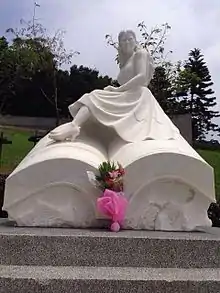Kuo Liang-hui 郭良蕙 | |
|---|---|
| Born | 17 August 1926 |
| Died | 19 June 2013 (aged 86) |
| Resting place | Taipei, Taiwan |
| Nationality | Chinese |
| Other names | Gloria |
| Occupation | Novelist |
| Known for | Romance fiction, the most beautiful female writer |
Kuo Liang-hui (Chinese: 郭良蕙; 17 August 1926 in Kaifeng, Henan – 19 June 2013 in Taiwan) was a Taiwanese novelist.[1] Several of her works were turned into films.[2][3]
Early life
Kuo Liang-hui was born in the Juye County in Shandong Province. She completed high school in Xi’an during the Chinese War of Resistance against Japan and started reading poetry at age of 16. She attended Sichuan University and became a student of Huang Ji Lu (Chinese: 黃季陸) and received a Foreign Language degree at Fudan University. Kuo moved to Chiayi, Taiwan after marrying Sun Ji-dong, pilot of the Republic of China Air Force in 1949. To increase income for living, Kuo started off with novel translations (including works of Guy de Maupassant), and soon became a novelist. Further to her first short story Young Group in Alley, she has a few columns in a number of renown magazines and her serialisation of novel Niwa edge made her a more confirmed position in the world of literature. She was named ‘the most beautiful female writer’ because of her appearance and attitude. At the time when The Lock of Hearts was published, Kuo shot to fame whilst she was criticised and prohibited on her sexual and ‘immoral’ affair topics and let to the biggest crisis in her writing career. Although this incident stroke a heavy blow and upset Kuo, she did not give up writing. At the same time, The Lock of Hearts became the hottest book selling below the ground which further boosted her name. In 1971, she travelled around the world on her own, leading her to the study heritage and arts. The Third Sex, published in 1978, was again one of the first novels ever talked about homosexuality.[4] As a brave, top-of-the-era female, Kuo later on established Kuo Liang Hui New Enterprise Co., Ltd., also to publish travel journals.

On 19 June 2013, Kuo died from stroke. Her statue is located in the celebrity cemetery zone of Chin Pao San, Jinshan District, New Taipei, Taiwan.
References
- ↑ The Columbia History of Chinese Literature 0231528515 p.1280 index Kuo Liang-hui
- ↑ Daw-Ming Lee Historical Dictionary of Taiwan Cinema - 2012 0810879220- Page 399 "Kuo Liang-Hui started to write wenyi novels in the early 1950s, but her novels often involved somewhat graphic extramarital affairs, a subject not as in demand among film producers as Chiung Yao's novels, which avoided any descriptions of ..."
- ↑ 中國婦女傳記詞典 Lily Xiao Hong Lee, A. D. Stefanowska, Sue Wiles - 2003 0765607980- Page 336 "The work of such writers as Ho Hsin, Hung Yen-ch'iu, Hsieh Ping-ying (q.v.), Ch'i-chün, Chang Hsiu-ya, Kuo Liang-hui, and Meng Yao appeared frequently on its pages. At the same time, Lin Hai-yin opened a window for the people of Taiwan ..."
- ↑ "勇於做自己的時代女性-郭良蕙" [The courage of women - Kuo Liang-hui] (in Chinese). Database of 1950s Chinese novelists. Retrieved 4 May 2016.